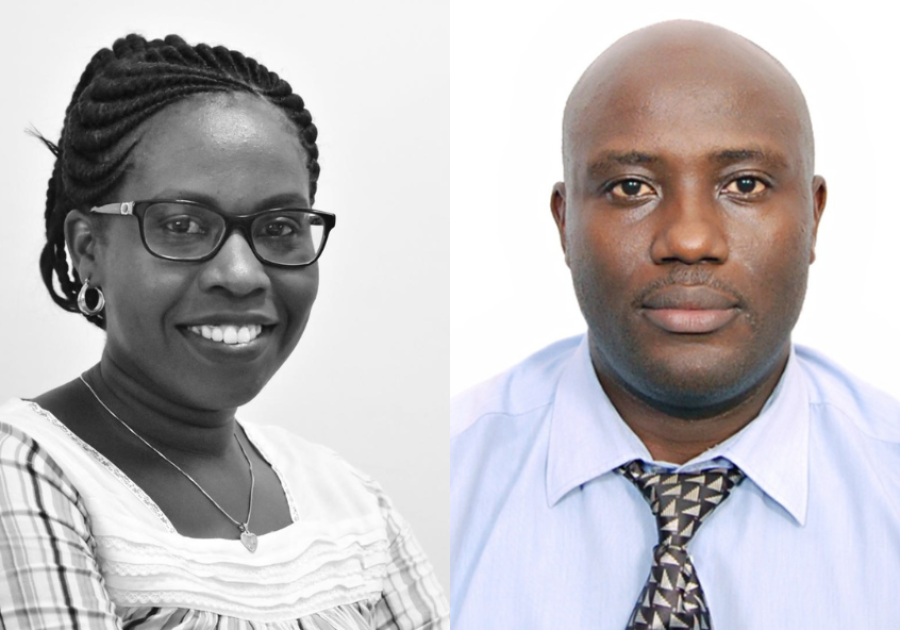First Peter Piot Fellows appointed to focus on epidemic preparedness and response
18 May 2023 London School of Hygiene & Tropical Medicine London School of Hygiene & Tropical Medicine https://lshtm.ac.uk/themes/custom/lshtm/images/lshtm-logo-black.png
Two early career researchers from sub-Saharan Africa have been appointed as the first Peter Piot Fellows focusing on epidemic preparedness and response.
Dr Doris Kemunto Nyamwaya and Dr Agaba Bekiita Bosco will be based in The Gambia and Uganda within the London School of Hygiene & Tropical Medicine’s Centre for Epidemic Preparedness & Response, and benefit from mentoring by global health and pandemics expert and former LSHTM Director, Professor Peter Piot.
Dr Nyamwaya will explore how chikungunya, a virus transmitted by infected mosquitoes, spreads in Africa and its associated disease burden while Dr Agaba will focus on strengthening malaria epidemic preparedness and response systems in Uganda including investigating what drives malaria epidemics and potential new emerging parasite pathogens.
In addition to the mentoring, the postdoctoral fellows can draw on multidisciplinary expertise from their supervisors and colleagues at the Medical Research Council Unit The Gambia at the London School of Hygiene & Tropical Medicine and The Medical Research Council/Uganda Virus Research Institute and London School of Hygiene & Tropical Medicine Uganda Research Unit.
Conceived in 2021, the Peter Piot Fellowships for Global Health Innovation scheme aims to foster the professional development of a new generation of specialists in key global health challenges of our time - epidemic preparedness and response, and planetary health – to mark Professor Piot’s tenure as LSHTM Director. It is supported by philanthropic donations from friends and supporters of LSHTM. The Fellowships cover costs including salary, accommodation and research budget.
Professor Piot said: “I am delighted that these two outstanding researchers will be able to work on important research and I look forward to getting to know them. I am sure we will learn from each other. It’s crucial to work with the brightest minds to have the best chance of making progress against pandemic threats and keeping our world safe and healthy for future generations.”
Dr Nyamwaya holds degrees from the University of Nairobi and the University of Oxford. Her research interests revolve around virology and other epidemic-prone pathogens. For her DPhil project, she uncovered a previously unrecognised burden of chikungunya fever in coastal Kenya, including the first report of neurological illnesses associated with chikungunya in Africa. These findings are likely to impact disease control policy in Kenya and are shaping a new research focus on immunology and vaccine development.
She said: “Chikungunya virus (CHIKV) is an acute febrile illness that has risen from relative obscurity to become a major public health problem globally. Despite advances in knowledge pinpointing towards continued circulation in Africa, description of the epidemiology and clinical manifestations is limited. There are no vaccines evaluated for it in Africa despite the fact the virus was first discovered in the continent as well as being the origin of the largest global epidemic.
“Data from this study will enhance knowledge on epidemiology of CHIKV in Uganda which can be extrapolated into other regions in the African continent. This will allow better preparedness for future epidemics by identifying the major underlying risk factors for the disease and optimising control strategies for maximum effectiveness. Characterisation of the circulating strains will guide research into development of drugs and vaccines.
“I am thrilled to be a recipient of the Peter Piot Fellowship, and thank the donors who have supported it. This opportunity will expand my networking space and allow me to gain additional research skills which I hope will accelerate my ability to lead on ground-breaking discoveries.”
Dr Agaba, who has a PhD in molecular epidemiology, has worked for nine years in clinical research including at the US Centers for Disease Control and Prevention (CDC), and 13 years in national disease control programs, epidemiological surveillance and epidemic response. His research focuses on investigating the drivers of malaria epidemics and molecular/genomic epidemiological surveillance of emerging pathogens.
He said: “Sub-Saharan Africa, and Uganda in particular, have been experiencing frequent malaria epidemics with significant complications, severe disease and mortality with devastating consequences. However, the potential drivers of these epidemics have remained unclear. At the same time there are reports of emerging parasite pathogens that evade diagnosis and treatment, but the extent of spread and possible contribution to the epidemics is unknown.
“This work will provide critical evidence to inform better predictions, preparedness and response systems to mitigate and minimise potentially devastating effects of malaria epidemics on populations at risk around the world.
“I would like to extend great appreciation to all involved in this exciting award. I’m extremely excited by the opportunity to take the next step in my career at LSHTM and looking forward to making it as impactful as possible.”
Professor Martin Antonio, Co-Director of the Centre for Epidemic Preparedness and Response at LSHTM, said: “These are two excellent candidates. We envisage the outputs of their work will provide – in the case of Dr Agaba – new tools and strategies for malaria control globally and – in the case of Dr Nyamwaya – produce evidence to help reduce the unrecognised burden of chikungunya fever and other neglected tropical diseases.”
Further Peter Piot Fellows from sub-Saharan Africa will be appointed later to work on planetary health research within the Centre on Climate Change and Planetary Health at LSHTM.
Another postdoctoral fellow, Dr Stella Atim, has been partially funded by the Peter Piot Fellowships for Global Health Innovation scheme. Her post forms part of a broader programme of fellowships in planetary health, led by LSHTM in partnership with Stanford University.
LSHTM's short courses provide opportunities to study specialised topics across a broad range of public and global health fields. From AMR to vaccines, travel medicine to clinical trials, and modelling to malaria, refresh your skills and join one of our short courses today.